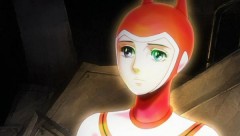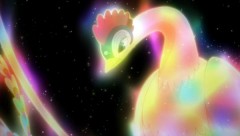 This installment of the Ten Years Later series is a personally fond one for me to reminisce on. I’ll be focusing on the TV series Hi No Tori, known in the US as The Phoenix. It’s an anime adaptation of story by “The God Of Manga” Osamu Tezuka. A former medical student turned comic creator, Tezuka revolutionized the methods for which both manga and anime were produced in Japan for more efficiency and better quality. Most of you reading this will be familiar with his best known anime Astro Boy (AKA Tetsuwan Atom), as well as some of his other works such as Kimba The White Lion (Jungle Emperor Leo) and Black Jack.
This installment of the Ten Years Later series is a personally fond one for me to reminisce on. I’ll be focusing on the TV series Hi No Tori, known in the US as The Phoenix. It’s an anime adaptation of story by “The God Of Manga” Osamu Tezuka. A former medical student turned comic creator, Tezuka revolutionized the methods for which both manga and anime were produced in Japan for more efficiency and better quality. Most of you reading this will be familiar with his best known anime Astro Boy (AKA Tetsuwan Atom), as well as some of his other works such as Kimba The White Lion (Jungle Emperor Leo) and Black Jack.
The Phoenix was Tezuka’s magnum opus series, which took place at various points of humanity’s past and future. Rather than telling a specific moral of any sort, the stories focused on various aspects of human existence, all while people either interacted with, battled for, or pursued a mythical firebird which possessed great wisdom and the ability to bestow immortality. Tezuka had already dabbled in religion and mysticism on other works like Buddha and In The Beginning (his manga adaptation of the Old Testament of the Bible). It was an interesting collection of stories which were seemingly converging on the present. One of them was adapted into a theatrical film in the late 70s. Three others were produced as 50-minute OAV / mini-features in the late 80s with high quality animation for the time.
The stories don’t have much of a message so much as they look at various aspects of human existence and how they can impact us on both physical and abstract levels, somewhat like a metaphysical version of The Twilight Zone or The Outer Limits. Characters go through things such as resurrection, nuclear war, huge sword battles, immortality, space travel, and great pain and hardship as their stories play out around the pursuit of the Phoenix (or the fleeing from it). One character’s story had him in an unorthodox experiment that made him see robots as people and people as monsters. Another story focuses on a medieval girl raised as a boy, whose violent actions have devastating, time-spanning consequences. A separate story sees a man fall in love with an alien during the craziest of times on Earth.
 Ten years ago, veteran anime director Ryosuke Takahashi adapted moments of the Phoenix story into a 13 episode TV series. Before it was broadcast on Japanese TV though, he brought a sample of it to Emory University in Atlanta where he gave a lecture on the history and future of anime, alongside Bandai producer Eiji Sashida who covered the economic aspects. One interesting aspect to the lecture was when Takahashi insisted the translator interpret his words using the term ‘cartoons’ in reference to the anime he spoke of. I came to figure if the man behind Armor Trooper Votoms, SPT Layzner and Blue Gender among other things could use the term ‘cartoons,’ so can I.
Ten years ago, veteran anime director Ryosuke Takahashi adapted moments of the Phoenix story into a 13 episode TV series. Before it was broadcast on Japanese TV though, he brought a sample of it to Emory University in Atlanta where he gave a lecture on the history and future of anime, alongside Bandai producer Eiji Sashida who covered the economic aspects. One interesting aspect to the lecture was when Takahashi insisted the translator interpret his words using the term ‘cartoons’ in reference to the anime he spoke of. I came to figure if the man behind Armor Trooper Votoms, SPT Layzner and Blue Gender among other things could use the term ‘cartoons,’ so can I.
Takahashi spoke with great reverence for Tezuka’s manga, which led him to the decision that the TV series would only have as much of a conclusion as its source, since the manga was unfinished at the time of Tezuka’s death. He truly wanted to respect Tezuka’s vision, and this does show in the final product in which several stories play out across 13 episodes. Anime Works / Media Blasters did a nice job releasing this series on 3 DVDs with thematic, colorful artwork. Thankfully, in the modern anime era, most dub performances are done by competent producer / directors such as Stephanie Sheh and Mike Sinterniklaas, alongside castmates Tony Oliver, Barabara Goodson, Mike McConohie, Steve Blum, Michelle Ruff, and many others sound pretty good throughout. As there haven’t been really too many works in recent days done to emulate his works, here’s hoping folks can still acquire this brief look at Tezuka’s last gift to his fans everywhere.










